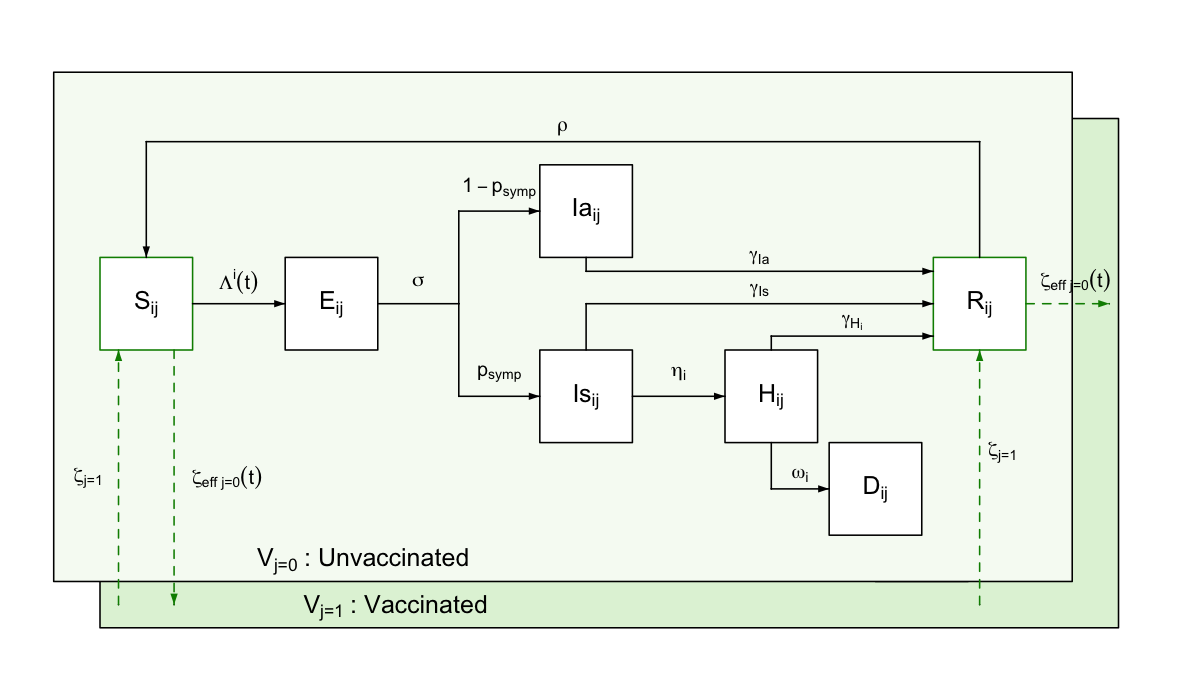daedalus implements an integrated epidemiological and economic model based on Haw et al. (2022), to help project the health and economic outcomes of directly transmitted respiratory epidemics and the measures taken to mitigate them, including restrictions on economic activity, vaccination campaigns, and changes in public behaviour.

Installation
You can install the development version of daedalus from the Jameel Institute R-universe, or from this repository using the pak package.
if(!require("pak")) install.packages("pak")
pak::pak("jameel-institute/daedalus", upgrade = FALSE)
# installation from R-universe
install.packages(
"daedalus",
repos = c(
"https://jameel-institute.r-universe.dev", "https://cloud.r-project.org"
)
)Installation notes
daedalus is under active development. To use a version of daedalus associated with major milestones, install a specific version from the list below.
IDM Thailand 2024 (R-only version):
pak::pak("jameel-institute/daedalus@v0.1.0")IfG workshop 2025 (with real time modelling):
pak::pak("jameel-institute/daedalus@v0.2.0")
Known issues
We have found the following issues with released versions:
v0.1.0: Consumer-worker contacts are not correctly handled, leading to higher and faster epidemic peaks.v0.2.0: Consumer-worker contacts are not included in the model, leading to lower and later epidemic peaks. The ‘recovered’ compartment does not include recoveries from hospitalisation. Please use the helper functionget_epidemic_summary()to get epidemic sizes.
Graphical dashboard
daedalus powers the graphical pandemic projections dashboard, Daedalus Explore, which allows users to try out the Daedalus model without having to write any code.
Quick start
The model can be run for any country or territory in the country_names list by passing the country name to the function. This automatically pulls country-specific demographic and economic data, which is included in the package, into the model (see the ‘Get started’ vignette for more details).
library(daedalus)
# run model for Canada
output <- daedalus("Canada", "influenza_1918")
# view the output
output
#> <daedalus_output>
#> • Country: Canada
#> • Epidemic: influenza_1918
#> • NPI response: none
#> • Vaccination: no vaccination
#> • Behaviour: no behaviour
# get pandemic costs as a total in million dollars
get_costs(output, "total")
#> [1] 967945.7
# disaggregate total for economic, education, and health costs
get_costs(output, "domain")
#> economic education life_value life_years
#> 27550.796 1749.039 938645.835 20383188.598Customising model parameters
Selecting historical epidemic parameters: Users can select infection parameters from among seven epidemics caused by directly-transmitted viral respiratory pathogens, which are stored in the stand-alone helper package daedalus.data. These can be called as
daedalus.data::infection_data, while epidemic identifiers are stored asdaedalus.data::epidemic_names.Custom country and infection parameters: Users can override default country contact data and epidemic-specific infection arguments by passing custom classes to
daedalus(); see the package website for more details.Modelling pandemic mitigation measures: Users can also model the implementation of pandemic response measures: for more on this see the documentation for the main model function
daedalus(), and the vignette on modelling interventions on the package website.Modelling parameter uncertainty: daedalus provides the
daedalus_multi_infection()function to easily model outcomes for multiple sets of epidemic parameters, which can be used to model outcomes under parameter uncertainty; see the vignette on modelling parameter uncertainty for more.
Related projects
daedalus is an R implementation of an epidemic projections model based on Haw et al. (2022) and on a project on the economics of pandemic preparedness.
daedalus.data is a stand-alone helper R package to handle input data for the daedalus model. Its purpose is to allow users to flexibly manipulate or change epidemiological and economic data, without needing to modify the model itself.
daedalus.compare is an R package that sits both downstream of daedalus and also wraps some daedalus functions to help users conveniently run multiple epidemic scenarios.
daedalus.api is an R package that connects daedalus with the DAEDALUS Explore dashboard.
Help
To report a bug, request a feature, or just start a discussion, please open an issue.